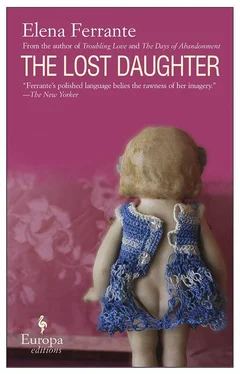I saw Nina insert an arm under her husband’s, she went off without turning even for a moment. She was talking, laughing. It seemed to me that she had been suddenly pushed—too slight as she was, between husband and sister-in-law—to a distance much greater than that which separated me from my daughters.
Outside the fair area was a chaos of cars, raveled streams of adults and children, either moving away from the stalls or converging on them. I went along the deserted streets. I climbed the stairs to my apartment, the last flight with a sensation of urgency.
The doll was still on the table on the terrace, the sun had dried her dress. I undressed her carefully, taking everything off. I recalled that Marta, as a child, had the habit of sticking things in every little hole she found, as if to hide them and be sure of finding them again. Once I came across tiny pieces of uncooked spaghetti in the radio. I took Nani into the bathroom, I held her by the chest with one hand, head down. I shook her hard, dark drops of water trickled from her mouth.
What had Elena put in there. I had been so happy to learn, when I was pregnant the first time, that life was reproducing in me. I wanted to do everything as well as possible. The women of my family swelled, dilated. The creature trapped in their womb seemed a long illness that changed them: even after the birth they were no longer the same. I, instead, wanted my pregnancy to be under control. I was not my grandmother (seven children), I was not my mother (four daughters), I was not my aunts, my cousins. I was different and rebellious. I wanted to carry my inflated belly with pleasure, enjoying the nine months of expecting, scrutinizing the process, guiding and adapting it to my body, as I had stubbornly done with everything in my life from early adolescence. I imagined myself a shining tile in the mosaic of the future. So I was vigilant, I followed the medical prescriptions rigorously. For the duration of the pregnancy I remained attractive, elegant, active, and happy. I talked to the creature in my belly, I had her listen to music, I read to her in the original the texts I was working on, I translated them for her with an inventive effort that filled me with pride. What later became Bianca was for me Bianca right away, a being at its best, purified of humors and blood, humanized, intellectualized, with nothing that could evoke the blind cruelty of live matter as it expands. I managed to vanquish even the long and violent labor pains I suffered, reshaping them as an extreme test, to be confronted with solid preparation, containing the terror, and leaving of myself—and above all to myself—a proud memory.
I did well. How happy I was when Bianca came out of me and, holding her in my arms for a few seconds, I realized that it had been the most intense pleasure of my life. If I look now at Nani with her head down, vomiting into the sink a brown spray mixed with sand, I find no resemblance to my first pregnancy; even the morning sickness was mild and didn’t last. But then came Marta. She attacked my body, forcing it to turn on itself, out of control. She immediately manifested herself not as Marta but as a piece of living iron in my stomach. My body became a bloody liquid; suspended in it was a mushy sediment inside which grew a violent polyp, so far from anything human that it reduced me, even though it fed and grew, to rotting matter without life. Nani, with her black spittle, resembles me when I was pregnant for the second time.
I was already unhappy, but I didn’t know it. It seemed to me that little Bianca, right after her beautiful birth, had suddenly changed and treacherously taken for herself all my energy, all my strength, all my capacity for imagination. It seemed to me that my husband, too caught up in his fury of accomplishment, didn’t notice that his daughter, now that she was born, had become voracious, demanding, hostile as she had never seemed when she was in my stomach. I gradually discovered that I didn’t have the strength to make the second experience exalting, like the first. My head sank inside the rest of my body, there seemed no prose, verse, rhetorical figure, musical phrase, film sequence, color capable of taming the dark beast I was carrying in my womb. The real breakdown for me was that: the giving up of any sublimation of my pregnancy, the destruction of the happy memory of the first pregnancy, the first birth.
Nani, Nani. The doll, impassive, continued to vomit. You’ve emptied all your slime into the sink, good girl. I parted her lips, with one finger held her mouth open, ran some water inside her and then shook her hard to wash out the murky cavity of her trunk, her belly, to finally get the baby out that Elena had put inside her. Games. Tell the girls everything, starting from their childhood: they’ll take care, later, of inventing an acceptable world. I myself was playing now, a mother is only a daughter who plays, it was helping me think. I looked for my eyebrow tweezers, there was something in the doll’s mouth that wouldn’t come out. Begin again from here, I thought, from this thing. I should have noticed right away, as a girl, this soft reddish engorgement that I’m now squeezing with the metal of the tweezers. Accept it for what it is. Poor creature with nothing human about her. Here’s the baby that Lenuccia stuck in the stomach of her doll to play at making it pregnant like Aunt Rosaria’s. I extracted it carefully. It was a worm from the beach, I don’t know what the scientific name is: the ones amateur fishermen find at twilight, digging in the wet sand, as my older cousins did four decades ago, on the beaches between Garigliano and Gaeta. I looked at them then spellbound by my revulsion. They picked up the worms with their fingers and stuck them on the hooks as bait; when the fish bit, the boys freed them from the iron with an expert gesture and tossed them over their shoulders, leaving them to their death agonies on the dry sand.
I held Nani’s pliant lips open with my thumb while I operated carefully with the tweezers. I have a horror of crawling things, but for that clot of humors I felt a naked pity.
I went to the beach in the late afternoon. I watched Nina in the distance, from my umbrella, again with the benevolent curiosity of the first days of the vacation. She was anxious, Elena wouldn’t leave her for an instant.
At sunset, as they were preparing to go home and the child was screaming that she wanted to go swimming again, and Rosaria intervened, offering to take her to the water, Nina lost her composure and began yelling at her sister-in-law, in a harsh dialect, full of vulgarity, which attracted the attention of the whole beach. Rosaria was silent. Instead Tonino, Nina’s husband, interrupted, and dragged her toward the shore, holding her by one arm. He was a man who seemed trained never to lose his composure, not even when his actions become violent. He spoke to Nina firmly but as if in a silent film, not a sound reached me. She stared at the sand, touched her eyes with her fingertips, occasionally said no.
The situation gradually became normal and the family swarmed in groups toward the villa in the pinewood, Nina exchanging cold words with Rosaria, Rosaria carrying Elena, now and again covering her with kisses. I watched Gino tidy up the beach chairs, lounge chairs, abandoned toys. I saw him pick up a blue pareo that had been left hanging on an umbrella and fold it carefully, with absorption. A boy came running back and, barely slowing down, grabbed the pareo rudely, then disappeared toward the dunes.
Time slipped away in a melancholy fashion, the weekend came, with its great influx of beachgoers; already on Friday they were arriving in masses. It was hot. The crowd increased Nina’s tension. She watched her daughter obsessively, springing like an animal as soon as she saw her move a few steps. We exchanged brief greetings at the water’s edge, a few words about the child. I knelt beside Elena, said to her something in play; her eyes were red and she had mosquito bites on her cheek and forehead. Rosaria came to put her feet in the water, but she ignored me; it was I who said hello and she answered reluctantly.
Читать дальше












